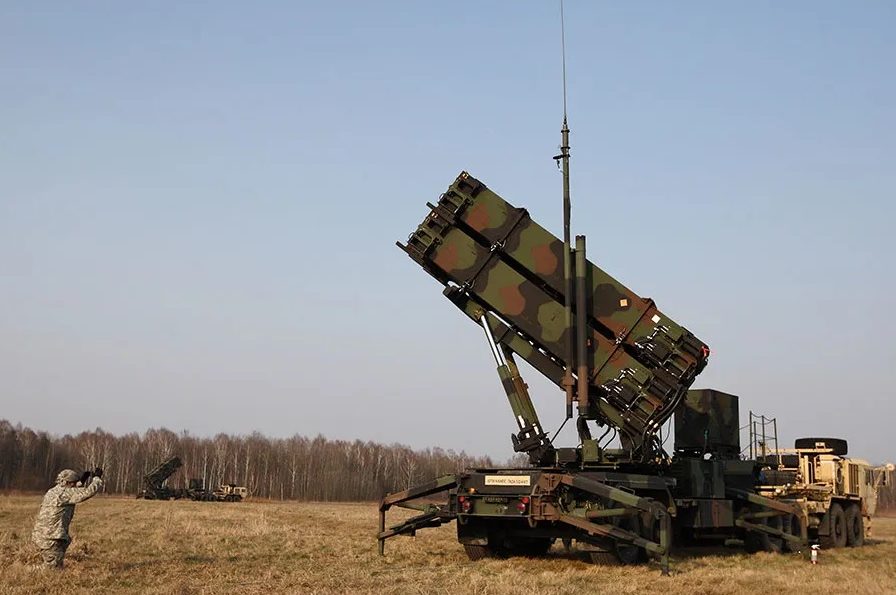When Israel and its allies shot down hundreds of Iranian drones and missiles, they demonstrated what an effective air defense looks like. The slow-moving Shahed-136 suicide drones were not hard for the Israeli, Jordanian, British, American and (probably) Saudi air forces to find and eliminate. Even Iran’s cruise missiles were thwarted. It was an overwhelming victory for Israel and a humiliation for Iran. In Ukraine, all this was watched with desperation and even anger.
While Israel boasts robust air defense systems and, with its allies, can deploy hundreds of combat aircraft to repel Iran’s attack, Ukraine must ration its defense munitions. Kyiv is forced to choose which cities to protect. Ukraine’s interception rate — which was above 75 percent in 2022 — is now down to 46 percent. Russians have adapted their routine so that after their missiles hit, they fire a second round (a “double-tap”) to kill the emergency services.
Zelensky has tried to dispel the idea that the US has a choice between supporting Israel or Ukraine
Could Ukraine’s allies not give it the same protection they give Israel? Such protection could have prevented 600 people from being crushed in the rubble of the Drama Theater in Mariupol. The Russian ballistic missiles loaded with banned cluster munitions that hit the train station in Kramatorsk, killing sixty-one, could have been intercepted. The Kremlin’s missiles might not have destroyed the shopping mall in Vinnytsia, killing twenty-eight. The list of tragedies goes on. Last week, Russian missiles destroyed the Trypilska thermal power plant, which provided electricity to the Kyiv region. Ukraine shot down the first seven of Russia’s eleven missiles, then ran out of rockets. More defenses are desperately needed.
Last month, Russia attacked Ukraine with more than 400 missiles, 600 Iranian-made drones and 3,000 guided aerial bombs. When the anticipated summer offensive begins, these tallies will probably double. Ukrainian soldiers now have barely enough weapons to hold the front line. The lack of air defenses means they are now exposed to Russian aircraft, which for the first time in this war have started dropping thousands of bombs. Since the beginning of the year, Russian forces have seized more than 140 square miles.
This week, Britain’s secretary of state, David Cameron, made the case for not helping to defend Ukraine’s airspace. The fear is that a western pilot could down a Russian plane: “The difficulty… is if you want to avoid an escalation in terms of a wider European war, I think the one thing you do need to avoid is NATO troops directly engaging Russian troops.”
But Russia’s pilots rarely enter Ukraine-controlled airspace: its drones and missiles do. And no one in Kyiv is asking the Royal Air Force to fly over Belarus and shoot down rockets, as they did to such effect last weekend over Iraq and Jordan. The request is for equipment, not men. In particular, Ukraine has asked for Patriot air defense systems, twenty-five of which, Volodymyr Zelensky said last week, would allow Ukraine to fully defend its airspace. Now, in the face of western hesitancy, Kyiv is begging for just six.
A few dozen F-16s, promised last year, are finally due to arrive this summer. President Zelensky has said they will be used to shoot down Russian drones and cruise missiles. But there are not enough defense systems to protect Ukraine’s airfields, so this squadron of jets may not last long. Russia, meanwhile, has thirty times more aircraft than Ukraine and unlimited drone supplies from Iran.
For months, Ukraine has been waiting for the next US aid package to be approved by Congress. Its members stand firm in support of Israel but are isolationist when it comes to Ukraine. Ohio senator J.D. Vance says that support for Ukraine risks weakening Israel by diverting the weapons needed for its defense: “Israel is much more important to the United States than Ukraine.” The fact that Ukraine has a defense treaty with the US and the UK (promising it protection in return for surrendering its nuclear weapons in 1994) is ignored.
Zelensky has tried to dispel the idea that the US has a choice between supporting Israel or supporting Ukraine. “Shaheds in the skies above Ukraine sound identical to those over the Middle East,” he said. “The impact of ballistic missiles, if they are not intercepted, is the same everywhere. Terror must be defeated completely and everywhere, not more in some places and less in others.”
He is choosing his words carefully: any hint of exasperation or ingratitude could be fatal. He cannot afford to alienate opinion in the House of Representatives. Many congressmen seem to be thinking what J.D. Vance is saying: that Ukraine is not worth the fight. That is another way of saying that Europe isn’t worth the fight. Donald Trump, the favorite to win November’s election, has said that he would cede part of Ukraine’s territory to Russia to achieve “peace.” He has even claimed he would encourage Moscow to invade NATO members which did not meet their defense spending targets.
Ukraine must defend itself, yet it is expected to fight Russia alone and not to be too successful. Its advances must be just sufficient enough to show that the cause is worth supporting. Ukraine is encouraged not to target Russian oil refineries, as this might cause oil prices to spike before the US presidential election, even though this would be the most effective way of inflicting damage on Russia. The western allies’ lack of resolve, as well as their indifference, makes Ukrainians fear that their sacrifice will be in vain. The petty politics signal to Putin that he can terrorize the country however he wants.
The truth, of course, is that without western support, Ukraine will lose the war. To witness Israel being given so much backup was painful. The West scrambled to help Israel because they wanted to deter an aggressor and prevent a wider war in the region. Surely the same logic applies to Ukraine and Europe?
This article was originally published in The Spectator’s UK magazine. Subscribe to the World edition here..


















